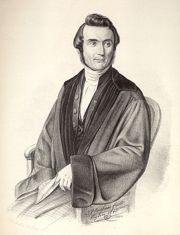
Jan Hendrik Scholten
Encyclopedia

Netherlands
The Netherlands is a constituent country of the Kingdom of the Netherlands, located mainly in North-West Europe and with several islands in the Caribbean. Mainland Netherlands borders the North Sea to the north and west, Belgium to the south, and Germany to the east, and shares maritime borders...
Protestant theologian
Theology
Theology is the systematic and rational study of religion and its influences and of the nature of religious truths, or the learned profession acquired by completing specialized training in religious studies, usually at a university or school of divinity or seminary.-Definition:Augustine of Hippo...
, was born at Vleuten
Vleuten
Vleuten is a former village in the Dutch province of Utrecht. It is a part of the city of Utrecht, and lies about 6 km west of it. In 2001, it became together with De Meern, a city part of Utrecht called Vleuten-De Meern. Vleuten has a railway station on the line between Utrecht and Woerden.In...
near Utrecht
Utrecht (city)
Utrecht city and municipality is the capital and most populous city of the Dutch province of Utrecht. It is located in the eastern corner of the Randstad conurbation, and is the fourth largest city of the Netherlands with a population of 312,634 on 1 Jan 2011.Utrecht's ancient city centre features...
.
After studying at Utrecht University
Utrecht University
Utrecht University is a university in Utrecht, Netherlands. It is one of the oldest universities in the Netherlands and one of the largest in Europe. Established March 26, 1636, it had an enrollment of 29,082 students in 2008, and employed 8,614 faculty and staff, 570 of which are full professors....
, he was appointed professor of theology at Franeker
Franeker
Franeker is one of the eleven historical cities of Friesland and capital of the municipality of Franekeradeel. It is located about 20 km west of Leeuwarden on the Van Harinxma Canal. As of 1 January 2006, it had 12,996 inhabitants. The city is famous for the Eisinga Planetarium from around...
. From Franeker in 1843 he went to Leiden as professor extraordinarius, and in 1845 was promoted to the rank of ordinarius. Through Scholten, Abraham Kuenen
Abraham Kuenen
Abraham Kuenen , Dutch Protestant theologian, the son of an apothecary, was born in Haarlem, North Holland....
became interested in theology; Scholten was not then the radical theologian he became later. The two scholars in course of time created a movement resembling that of the Tübingen School in Germany.
Pursuing first the study of dogmatic theology and the philosophy of religion, Scholten published a work on the Principles of the Theology of the Reformed Church (2 vols, 1848-1850, 4th ed. 1861-1862). He then gave special attention to the New Testament
New Testament
The New Testament is the second major division of the Christian biblical canon, the first such division being the much longer Old Testament....
, and wrote A Critical Study of the Gospel of John (1864, in German 1867).
Scholten's other works include:
- Historical and Critical Introduction to the New Testament (1853-1856)
- The Oldest Witnesses to the Writings of the New Testament (1866)
- The Oldest Gospel (1868)
- The Pauline Gospel (1870)
- A Comparative View of Religions
An account of his theological development is given in Afscheidsrede bij het Neerleggen van het Hoogleeraarsambt (1881), and in the biography written by A Kuenen, Levensbericht van J. Henricus Scholten (1885).

